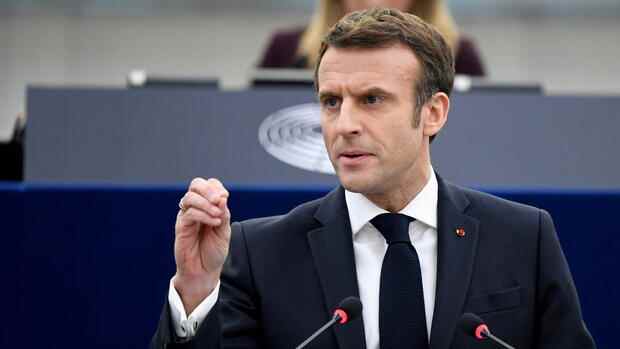Brussels, Berlin The speech before the European Parliament is a must for Emmanuel Macron. France has held the EU Council Presidency since the beginning of the year, and in this role the President sets out his European agenda for the next six months. But his speech on Wednesday was not only aimed at the MEPs in Strasbourg and the governments in the member states.
The addressees also included Russian President Vladimir Putin: In view of the Russian troop deployment on the border with Ukraine, Macron reminded the Kremlin chief that three decades ago Moscow had agreed to a European order based on the principle of inviolable national borders and the renunciation of military force and threats based.
In his speech, Macron called on Europeans to defend these principles and sanction violations. At the same time, he proposed creating a new “security and stability order” in which Russia should participate. The French President does not want to accept that in recent weeks it is actually the Russians and the Americans who are negotiating war and peace at the borders of the European Union.
The supporting role of Europeans comes as a reality shock to Macron’s vision of a sovereign Europe that can determine its own destiny in the world. In his speech to the European Parliament, he also spoke about the EU as a “power of the future” that must be able to respond to the challenges of climate change, digital transformation and geopolitics.
Top jobs of the day
Find the best jobs now and
be notified by email.
For Macron, the Ukraine crisis is just further evidence that Europeans need to take their destiny more into their own hands. He wants to work out the new security order in three steps: First, the EU should agree on a plan, then Macron wants to coordinate it in NATO and then submit it to Russia.
EU fears Russian invasion of Ukraine
Macron wants to regulate the handling of nuclear weapons, the control of conventional weapons, transparency for military activities and respect for the sovereignty of states. The President did not provide any further details.
His offer could be intended as a way out of the complicated diplomatic situation in which Russia and the West currently find themselves. Russia has concentrated its military in front of the Ukrainian border. The Kremlin has accompanied this with statements suggesting that it considers Ukraine to be a legitimate part of Russia. Western countries fear that Russia is preparing an invasion.
For years he has defended the dialogue with Russia, said Macron. At the same time, he threatened sanctions if Moscow violated the applicable rules. He also enumerated the freedom of choice of sovereign states. Macron thus rejected Russia’s demand that no other Eastern European countries should be admitted to NATO.
Like German Foreign Minister Annalena Baerbock (Greens), Macron advocated reviving the Normandy format with which France, Germany, Ukraine and Russia have been talking since 2014 about Russia’s occupation of parts of Ukraine.
No conversation has taken place since 2019. Russia has so far refused to meet. Instead, Foreign Minister Sergey Lavrov wants to meet his US colleague Antony Blinken in Geneva on Thursday.
Macron has many plans
Macron had already planned a lot for the six-month presidency, even before his advance in the Ukraine conflict. However, he did not linger in the European Parliament with the details of his programme, which he had already presented in Paris in mid-December.
In his speech, he was concerned with the broad lines, the philosophical superstructure of his ambitious agenda for Europe. At its core are three promises: democracy and the rule of law, social and economic progress, and peace and security.
“It’s our job, and no doubt the job of our generation, to put those promises on a new footing,” Macron said. Behind his call for a new security architecture with Russia’s participation is the idea that Europe must act as an independent “balancing power” in the world. In Germany, but above all in Eastern European countries, he encounters great skepticism.
Macron also sees fundamental European values at risk – from Russia’s policies, but also from the actions of the governments in Poland and Hungary. “We are in a fight for liberal democracy, a fight against foreign interference in our elections,” he said. “The end of the rule of law means a return to authoritarian regimes.”
In some European capitals, the rule of law is believed to be a “Brussels invention”. But they are part of European civilization and anchored in the EU treaties. “The rule of law is our treasure,” said Macron.
The French President announced that he would support the inclusion of environmental protection and the right to abortion in the European Charter of Fundamental Rights. It is about convincing people again of the value of the rule of law and democracy in the European Union.
The EU Charter of Fundamental Rights was signed in 2000 and has been legally binding since December 2009, which means that EU citizens can claim their fundamental rights on this basis. The text summarizes all the civil, political, economic and social rights of European citizens. Macron also announced that he would work at EU level for a quota of women on supervisory boards.
More: Fragmented and partly populist: Why France’s left is threatened with insignificance
